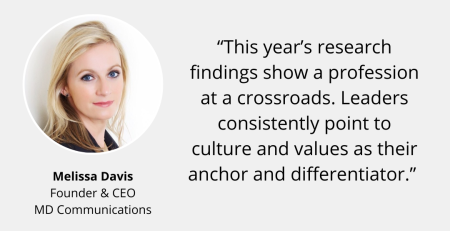Melissa Davis, a member of the IBA’s newly founded European Regional Forum wellbeing working party, highlights the IBA’s massive wellbeing survey, one of the largest of its kind, which is a first step in addressing the parlous state of mental health in the legal sector.
With the focus on wellbeing at work coming to the fore over this past year, the IBA is to be applauded for taking the lead in examining the parlous state of wellness in the legal profession. With two global surveys, looking at both individuals and legal institutions, it has garnered responses from over 3,000 individuals and over 180 legal bodies.
This is groundbreaking work, with the surveys representing the first of their kind from an international standpoint. The responses make for sobering – if not surprising – reading. Lawyers from every corner of the globe reported that their wellbeing is well below par and, more alarmingly, 41% said they could not access help from their employer due to stigma or fears their career would be negatively impacted.
Our recent webinar on resilience found that 59% of the audience polled said that vulnerability was not encouraged by leadership at their firms, so clearly this is an area for firm leaders to focus on.
Wellbeing and productivity
With so much now known about the effect of wellbeing on productivity in the workplace, and with stress and dissatisfaction at work spilling over into every other aspect of life, this is an area that needs to be urgently tackled.
Wellbeing has a direct and massive impact on how well we perform at work, with the World Health Organization identifying direct links between poor standards of wellbeing and increased absenteeism, lower standards of work, demotivated and burnt-out staff, and damaged relationships between colleagues. A recent report from the CIPD noted that “the main risks to people’s health at work are psychological… We seem to accept that stress and exhaustion is the new normal – we shouldn’t.” Another report from Deloitte estimated that poor mental health – manifesting via absenteeism, presenteeism, and staff turnover – cost employers in the UK between £42 and £45 billion per year.
The IBA is doing sterling work in creating a baseline from which key areas for improvement can be identified and an education programme for employers put in place. Anecdotally, the state of wellbeing in the legal profession has been poor for a long time, with previous studies also identifying this as a problem. Now we have more far-ranging, hard evidence and extensive metrics to help us start repairing the profession’s wellbeing crisis.
Wellbeing decreases with intersectionality
The survey found – again not surprisingly – that women, young people, ethnic minority groups, and those with disabilities reported wellbeing index scores consistently below the global average for other respondents. This identification of intersectionality is important as we can target groups most at risk, and provide additional training for businesses to spot issues before they become insurmountable.
That young people are more affected is also concerning, as they will be the next generation of lawyers rising through the ranks – if stress and mental ill health have been ‘baked in’ from the start of their careers, it will be even harder to create a healthy, thriving culture at work.
Next steps for law firm leaders
It makes good business sense to ensure staff – a company’s most important aspect, as is hammered home on so many law firm websites – are content, in good mental health and therefore productive. This new study shows that the profession is, in the main, achieving the opposite of this.
So what can leaders do to support their staff’s mental health, bearing in mind that problems are likely to be exacerbated by the annus horribilis we have all just endured?
- Acknowledge the problem and ensure it is given priority in the workplace – 28% of respondents within the IBA’s survey specifically cited the need for increased levels of awareness, with 23% also explicitly calling for more resources for professional support and direct intervention. Leaders can devote a chunk of budget to wellness programmes and even coaching or therapy for those in need.
- Foster a top-down approach – leaders need to live healthy behaviours, so that these are imitated by staff. It’s no good telling your staff not to work at weekends or send emails out of hours if they witness their bosses doing this – it will become passed down as part of the firm’s culture. Firm and healthy boundaries should be modelled by senior staff, with those acting outside of these offered assistance.
- Educate themselves about what good mental health looks like and how to spot problems, as well as how to embed a healthy working culture. Examine other industries and copy their tactics, and read and listen to influencers on the topic to understand how to create wellness at work. There are numerous workplace wellbeing programmes and consultants, many of which have free resources to be mined.
Wellbeing working party
I am proud to be a member of the newly founded IBA European Regional Forum wellbeing working party chaired by Chris Owen and Anna Dąbrowska. We are hoping to use these surveys as a way to start a global discussion on how we can support the sector to improve its mental health.
Chris Owen comments: “What this research shows is that lawyers are aware of the issue and are seeking ways to promote their own mental wellbeing. To be effective, they do however need support and active engagement from their own law firms and bar associations. The challenge is now for the law firms and bar associations to engage with their lawyers on the issue.”
The working party will support the IBA’s wellbeing taskforce, which is spearheading this campaign. Set up in 2019 by the Immediate Past President Horacio Bernardes Neto, its aim is to implement internationally coordinated responses to the wellbeing crisis. Its next two steps are around (a) raising awareness and destigmatising discussions around mental health and wellbeing, particularly within jurisdictions where recognition of these issues within the legal profession is not well-developed, and (b) investigating how institutions can translate awareness into effective interventions to improve workplace culture and tackle relevant structural issues in the profession to prevent the many suffering alone or in silence.
Sara Carnegie, Director of Legal Projects at the IBA commented: “The evidence shows us that there is a problem across all jurisdictions and all legal sectors. There is a marked difference between what law firms say they are doing and how employees perceive these efforts as insufficient and not meaningful. We need to change this, overcome the stigma and see physical and mental health having equal importance in the workplace.”
To continue this and as a pro bono commitment to support the mental wellbeing of the sector, we will be hosting a mental health series of webinars. The next is 29 April, which will look at perfectionism and addiction in the legal sector, featuring Andy Ramage, co-founder of One Year No Beer, Elizabeth Rimmer, CEO of legal mental health charity LawCare, and Jeff Davis, GC and vulnerability advocate.












